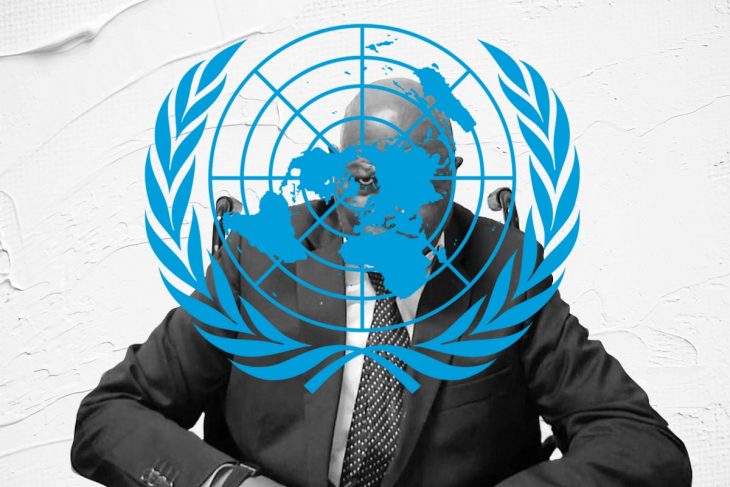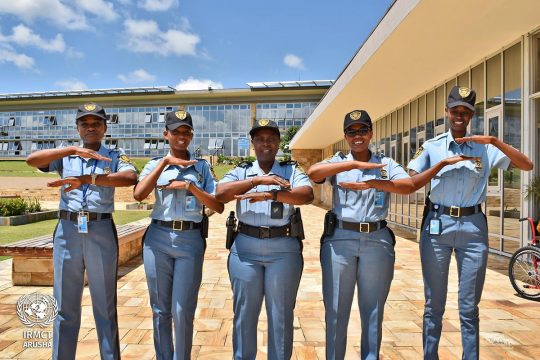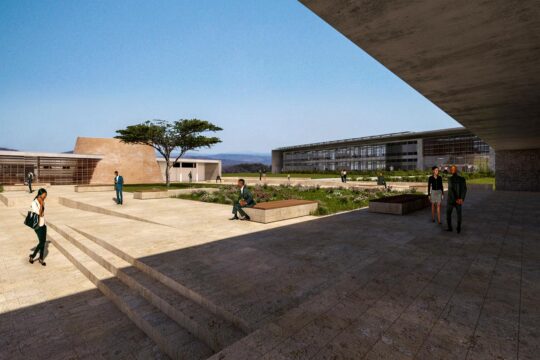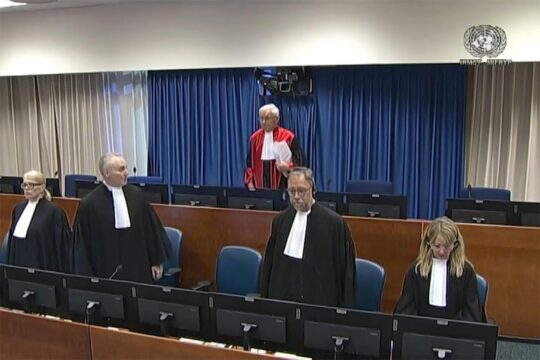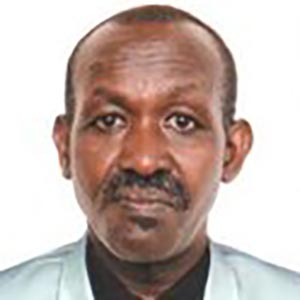Were it not for the United Nations flag, nothing distinguishes house number 6 in street 617 from other houses in the Rugando neighbourhood of Kigali’s Kimihurura sector. On the morning of February 14, 2023, when Kabuga's trial resumes, a guard dressed in the black, green and red of a local security company refuses access to more than 20 men and women, some of whom look unwell. Voices rise, they don’t understand “What happened today? Why don't you want us to come in?" They are regulars here, but it doesn’t work. "Come back at 2 pm", they are told.
This is where, since July 1, 2012, a branch of the Mechanism for International Criminal Tribunals (MICT) has taken up residence in the Rwandan capital Kigali. It’s a sort of outpost in Rwanda to manage, among other things, assistance for witnesses at this tribunal, from their identification to their travel, including their security "before, during and after trials", reads its Rules of Procedure and Evidence. It is also where a medical centre treats and supports some of the witnesses called by the Mechanism and the former International Criminal Tribunal for Rwanda (ICTR), which was based in Arusha, Tanzania. The protesters this morning were patients at the clinic. Some of them were lying on the side of the road, waiting for four hours until the door opened at the appointed time.
This little incident outside the gate of number 6 signals the closed door hearing by video conference from this place of witnesses in the Kabuga trial. The trial is being held 6,500 kilometres away as the crow flies, in The Hague, capital of the Netherlands. Evoking Kabuga’s failing health, an MICT officer at the Kigali office had told Justice Info a week earlier that: "We are waiting to see if he will recover and thus have confirmation that the trial will resume on February 14, with witnesses from Kigali, who should give their testimony by video conference, behind closed doors. Only the witnesses will be in the room, with technicians. Even we, the staff of the Mechanism, will not have access.”
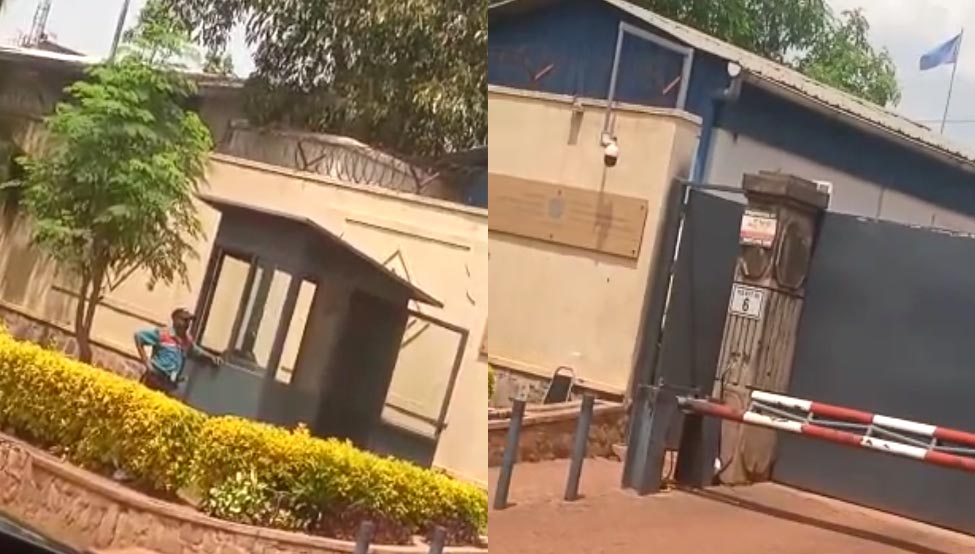
"We have not provided a room"
But how, then, can one follow the trial? "We have not provided a room where people can follow the hearings. Here we are closed, we do not give free access to the public," explained the officer, who wished to remain anonymous. To overcome this restriction, this person adds, a link has been created on the website of the Mechanism to allow people, wherever they are, to follow the trial in real time. As for the testimony of witnesses, the first ones went to The Hague, the next ones to Arusha, and this time, "it will be here (Kigali), but under the conditions that I said," explained the officer.
As for traffic on the MICT website for the Kabuga trial, the MICT external relations office in Arusha estimates that "there were more than 5,000 separate streams for the opening statements on September 29 and 30”. According to the same source, for the regular sessions there were between 1,000 and 1,200 unique feeds per week on average. This does not take into account, adds the MICT, people watching in groups, for example in classrooms or other institutions.
"It's postponed to Valentine's Day"
On a platform of journalists from different Rwandan media, reporters covering international trials keep asking the same question: "Will the Kabuga trial finally resume?" Always jovial and joking, the journalist-host of this forum, Gérard Manzi, is the right man to soften the blow. "The old man is still hiding, even today. It’s postponed to Valentine's Day!" he says ironically. Indeed there were postponements one after the other in early 2023. The trial was initially scheduled to re-start on January 31, then February 7, and then on Valentine’s Day, February 14.
In this forum, some do not hide their disillusionment, suspicions, or even what they think the outcome of the trial will be. "What if he puts an end to his trial himself?” said one person, alluding to the deteriorating health of the accused, which could result in his death. Another mentioned, as a reminder, the case of Joseph Nzirorera, who died during his trial at the ICTR. The journalists grumble about the lack of information on the trial.
"Yes, but since he no longer has the means to hide himself, who is hiding him?” another asks. For them, hiding means delaying justice, or evading it with "delaying tactics”. "What with the way he managed to stay on the run, the media hype around his arrest contrasts with the silence around his trial," says young Sam Kwizera, and his elder Jean-Baptiste Karegeya drives it home. “For me," says Karegeya, "everything is linked: his successful escape for more than 23 years, the silence and the delaying tactics in his trial. Even during his trial, he manages to hide himself, one might say, from the media, the people and the victims in particular!"
"His trial was the most awaited”
"It is very difficult to follow the hearings in the Kabuga case because following online we get choppy information, as the connection can break at any moment,” confirms Jean-Damascène Manishimwe, a journalist at the state-owned Rwanda Broadcasting Agency (RBA). “The information we get is too limited and, in turn, we cannot fully inform our audience." In the absence of an RBA special envoy to The Hague, the Kabuga trial is almost absent from its programmes. It nevertheless produced a series of special editions at the time of his arrest, using archival footage from the national television. "In short, the disappointment is total, even though Kabuga was the most wanted by the ICTR of all the genocide suspects, and his trial the most awaited!” says Manishimwe.
"I must admit that the coverage of the Kabuga trial by Rwandan journalists is not at a satisfactory level," says Juvens Ntampuhwe, coordinator at the Justice and Memory project of RCN Justice & Democracy. For the trials of Rwandans tried in France and in Belgium under universal jurisdiction, this NGO financed journalists to go to Paris or to Brussels for the duration of these trials. But in the case of Kabuga, Ntampuhwe explains, "given the advanced age of the accused and his state of health, the hearing schedule has been arranged to favour his participation [i.e. two hours a day, two days a week]. You can understand that there is no way to objectively determine, even on an estimated basis, the total duration of the trial. In such a trial, RCN cannot consider sending journalists to The Hague.”
"We don't know anything, we don't see anything”
Janvier Bayingana, legal affairs officer commissioner for the Ibuka association which represents the victims of the 1994 genocide in Rwanda, does not mince his words against the UN mechanism. He says its liaison office in Kigali "should inform, that's what it should do. Instead, they are in their routine bureaucracy, it's like their private property, it's as if they have no beneficiaries. For them, the liaison office is for distribution of documents, requesting documents from witnesses, visa applications and taking care of them. They are there for documentation and travel, that's all!"
Rwandans are not informed, he stresses repeatedly. "Justice is administered in the total silence of their offices, with them the only witnesses to what they do - this is not justice!” he says. “Justice must not only be done, it must be seen to be done. Today, we know nothing, we see nothing!” For the victims, Bayingana believes, "it is not enough to know that a tribunal has been set up to try suspects of genocide crimes, they need to see and know more about how this tribunal delivers justice on behalf of the victims and the international community. This tribunal should change many things in the way it administers justice!"
This is echoed by a genocide survivor in Rubavu, in the former Gisenyi prefecture, where Kabuga is alleged to have committed some of the crimes. According to the amended indictment dated March 1, 2021, Kabuga is accused of having "between April and July 1994 (...) collected funds for the purchase of arms and ammunition, imported arms and ammunition which were distributed to the Interahamwe [militias] in Gisenyi”. According to the same document, these acts were committed in several places in the prefecture, including the Méridien Izuba hotel, the Umuganda stadium and the Gisenyi military camp.
"We would have liked to see Kabuga here, as he was in 1994, so that we could say everything about him," laments Innocent Kabanda. “But since this is not happening, we would still like to see his trial speeded up, so that death does not take him before he is judged and the victims of his crimes thus deprived of justice.”


